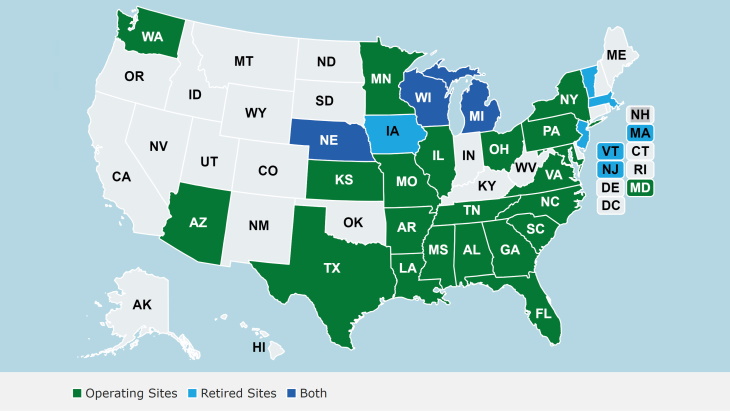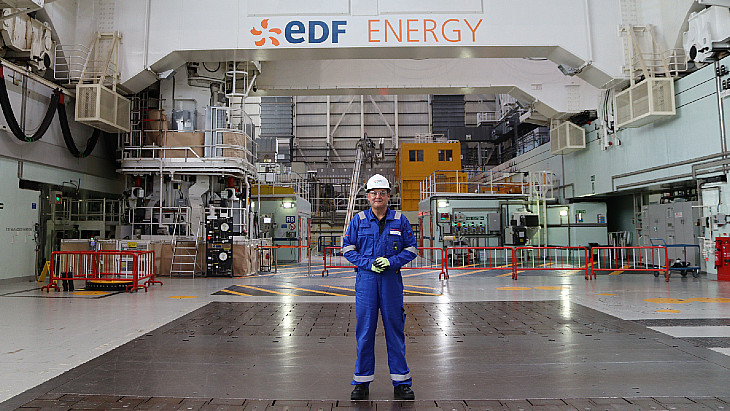Nuclear skills gaps addressed worldwide
Friday, 19 October 2007
Yevgeny Nadezhdin, the UN Economic Council for Europe's regional advisor on energy said in Belarus: "It is essential to realize that construction costs are not the most important thing. The main thing is personnel training. Such training should begin right now, and do it outside Belarus, as there are no people here to train professionals."
In response, deputy energy minister Mikhail Mikhaddzyuk told Belorussian News the country had established a special training program, reached agreements with several countries, and had secured assistance from the International Atomic Energy agency. He added that Belorusian nuclear workers currently in Lithuania, Russia and Ukraine could return home.
Separately, Nuclear.Ru has reported that Belarusian officials are investigating two sites in the Mogilev region: Krasnopolyanskaya and Kushinovskaya. Russia's AtomStroyExport is active in Belarus and has suggested that it act as either main supplier, or as an organizer if another vendor's reactor would be chosen. An ASE official said that four 1000 MWe reactors were under consideration.
Lukashenko told Kyodo News Agency on 18 October that 'American-Japanese, French-German and Russian' reactors were under consideration. He apparently did not distinguish between the two American-Japanese possibilities of General Electric and Hitachi, who merged their nuclear businesses or of Westinghouse, which is owned by Toshiba.
Belarus' first vice prime minister said that a draft law on nuclear power should be submitted for review next month.
Belarusian President Alexander Lukashenko has been told that his plans for a nuclear power plant are in jeopardy without adequate nuclear engineering skills. His is not the only country facing a skills gap.
Belarusian President Alexander Lukashenko has been told that his plans for a nuclear power plant are in jeopardy without adequate nuclear engineering skills. His is not the only country facing a skills gap. Yevgeny Nadezhdin, the UN Economic Council for Europe's regional advisor on energy said in Belarus: "It is essential to realize that construction costs are not the most important thing. The main thing is personnel training. Such training should begin right now, and do it outside Belarus, as there are no people here to train professionals."
In response, deputy energy minister Mikhail Mikhaddzyuk told Belorussian News the country had established a special training program, reached agreements with several countries, and had secured assistance from the International Atomic Energy agency. He added that Belorusian nuclear workers currently in Lithuania, Russia and Ukraine could return home.
Separately, Nuclear.Ru has reported that Belarusian officials are investigating two sites in the Mogilev region: Krasnopolyanskaya and Kushinovskaya. Russia's AtomStroyExport is active in Belarus and has suggested that it act as either main supplier, or as an organizer if another vendor's reactor would be chosen. An ASE official said that four 1000 MWe reactors were under consideration.
Lukashenko told Kyodo News Agency on 18 October that 'American-Japanese, French-German and Russian' reactors were under consideration. He apparently did not distinguish between the two American-Japanese possibilities of General Electric and Hitachi, who merged their nuclear businesses or of Westinghouse, which is owned by Toshiba.
Belarus' first vice prime minister said that a draft law on nuclear power should be submitted for review next month.
| Education initiatives Problems in supplies of nuclear professional are not only faced by Belarus. Worldwide, several inititives have recently come to light. Russia Plans are in development for a Federal Nuclear University, to be hosted by the Moscow Engineering Physics Institute (MIFI). The initiative is one part of a wider response to the development of Russia's new nuclear build plans. The Federal Atomic Energy Agency (Rosatom) has firmly planned eight large reactors for completion between 2013 and 2016. A further 14 large unit will follow up to 2020 as well as six smaller VK-300 boiling water reactors in that timeframe. According to a Nuclear.Ru report, it has been suggested that Rosatom coordinate work with the Ministry of Education to set state educational and professional standards. Further liaison would also be required between Rosatom and the Ministry of Defence to employ staff from the nuclear navy in the commercial nuclear power sector. Vietnam On a smaller scale in Vietnam, the Hanoi University of Technology (HTU) this month started its second annual course in nuclear power plant technology. With sponsorship from Toshiba and the Vietnam Atomic Energy Commission, 30 scientists and engineers from the HTU will attend the five-week course. Ha Manh Thu of HTU said: "The program will provide skill training for the first nuclear power plant in Vietnam, which will be built in 2020 in Ninh Thuan province." Last year, Toshiba granted $2500 in scholarships to ten outstanding HUT students, taking three of them to Toshiba factories and power plants in Japan. United Kingdom In Britain, the drive to create a new national nuclear training network has advanced with the creation at Lancaster University of The Lloyd's Register Educational Trust Chair in Nuclear Engineering and Decommissioning. GBP755,000 ($1.55 million) in funding for the chair has been agreed over five years with the Lloyd's Register Educational Trust, a charity connected to Lloyd's Register the risk management organisation. The UK has put together a comprehensive clean-up program under the Nuclear Decommissioning Authority and is also becoming increasingly serious about building new nuclear power plants. Meanwhile, the country's industry has been shaken up by the dismantling of the former giant British Nuclear Fuels. |
Most Read
_92619.jpg)
Deep Atomic launches SMR for data centres
Friday, 25 October 2024
_84504.jpg)
Framatome to share fast reactor experience with Japan
Friday, 6 December 2024

Czech Republic selects Rolls-Royce SMR for small reactors project
Thursday, 19 September 2024

Study shows existing US sites suitable for new build
Tuesday, 10 September 2024
Podcasts & Features
Podcast: What happened with nuclear energy at COP29?
Podcasts & Features Friday, 29 November 2024
Podcast: What next for UK's record-setting Heysham 2 nuclear power plant?
Podcasts & Features Monday, 11 November 2024









